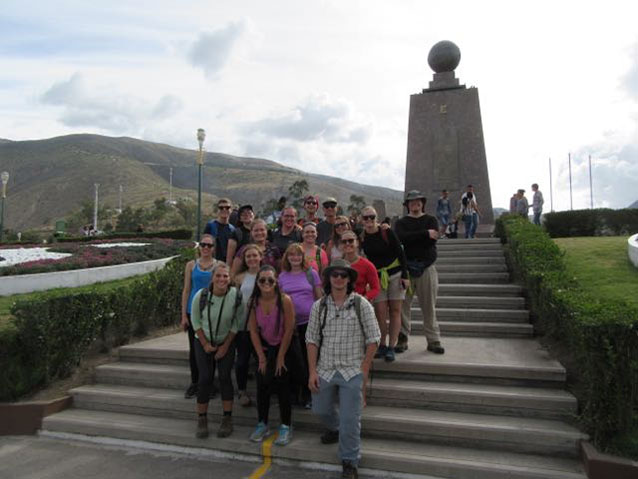A passion for studying the Earth and its atmosphere can take you to some rather amazing places. This past August, 17 students joined me and Dr. Steve Anderson on a 12-day faculty-led study abroad journey through northern Ecuador. Students on the trip received credit for Earth Science courses, and over the next couple of months, they will be sharing their stories and adventures through a series of posts on this blog.
Why Ecuador?
Ecuador is a small country located in western South America, bordering the Pacific Ocean, and includes the islands of the Galapagos. The continental part of this country is divided into three geographic regions: the Coast, the Amazon, and the Andes, which run down through the center of the country from Colombia to Peru.
This highly variable topography creates a broad diversity of climates and landscapes within a fairly small region. Volcanoes dot the spine of the Andes, and the Amazon rainforest, home to broad, winding rivers, and towering old-growth trees, hugs its eastern slope.
This country provides an ideal launching point for an exploration of the diversity of life, and the impact of natural phenomenon (geologic activity, diverse weather patterns, and changing climate) over a fairly small region.
Culturally, this small country is just as diverse. While the principal language is Spanish, there are as many as 10 different varieties of the traditional Kichwa language spoken throughout the country.
Our Journey
We traveled through a range of climates and natural wonders on our exploration of Ecuador. Some highlights include:
- A visit to historic Quito and the Equator (i.e., the Middle of the World), which passes just north of Quito.
- Exploration of the cloud forest of Mindo.
- Visits to the active volcanoes of Cotopaxi and Quilotoa.
- A homestay with an indigenous community, Agato, near Otavalo, and an opportunity to learn about their customs, beliefs, way of life, and relationship with the natural world.
- A taste of the Amazon rainforest along the Napo River, which included hikes through primary growth forest and opportunities to learn about local culture.
Traveling someplace new has the potential to open up your mind about the world, and shift your perceptions of your place in it. We hope you enjoy these stories, and stay tuned for future opportunities to travel with faculty from the Department of Earth and Atmospheric Science at UNCO!


